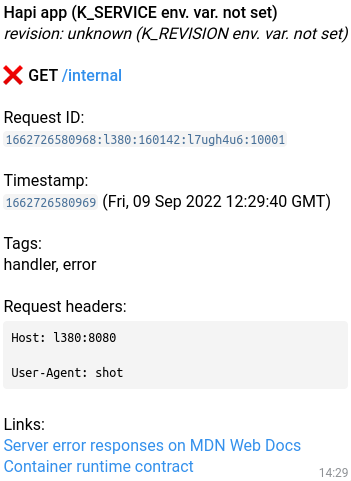@jackdbd/hapi-telegram-plugin
@jackdbd/hapi-telegram-plugin
Hapi plugin that sends a message to a Telegram chat when a request matches one of the rules you defined.
Table of Contents
Installation
npm install @jackdbd/hapi-telegram-plugin
Preliminary Operations
Create a Telegram bot with BotFather
A Telegram bot is an API that implements webhooks. When you create a Telegram bot with BotFather, Telegram creates an API on its servers. You can then make HTTP requests to this API.
This Hapi plugin makes a POST request to the /sendMessage endpoint whenever there is an error in your request handlers.
Create a Telegram bot with the following steps:
- Open a Telegram chat with BotFather and enter the
/newbotcommand. - Choose a
nameand ausernamefor your bot. Thenamecan be anything and you can change it any time. Theusernameis unique, you cannot change it, and must end with_bot. Write down the bottokenthat BotFather returns you.
:information_source: You can see your Telegram bot
tokenat any time:
- open a chat with BotFather
- enter the
/mybotscommand- select the bot you are interested in
- click
API token
See also the ufficial Telegram documentation:
- Bots: An introduction for developers.
- sendMessage API endpoint.
- message formatting options. A Telegram message can be 1-4096 characters long, after entities parsing.
Usage
You define request rules like this one:
{
name: 'notify me of any server error (e.g. internal server error)',
chat_id: 'YOUR-TELEGRAM-CHAT-ID',
token: 'YOUR-TELEGRAM-BOT-TOKEN',
predicate: isServerRequestError,
text: serverError
}
...and this plugin sends a Telegram message like this one:

Let's say that you want to receive notifications for server errors (i.e. HTTP 5xx), and notifications for unauthorized errors (i.e. HTTP 401). You would configure the plugin like this:
import telegram from '@jackdbd/hapi-telegram-plugin'
import type {
Options as TelegramPluginOptions
} from '@jackdbd/hapi-telegram-plugin'
// define your request predicates somewhere in your app,
// or import them from a library.
import {
isServerRequestError,
isUnauthorizedRequestError
} from '@jackdbd/hapi-request-event-predicates'
// define the functions that create the text string to
// send to Telegram, or import them from a library.
import {
serverError,
unauthorized
} from '@jackdbd/hapi-telegram-plugin/texts'
export const app = async (config) => {
const server = Hapi.server({ port: 8080 })
server.log(['lifecycle'], {
message: `HTTP server created.`
})
const options: TelegramPluginOptions = {
// when a request to your Hapi app matches a rule, this plugin
// sends a message to the Telegram chat specified in that
// particular rule.
request_event_matchers: [
{
name: 'notify of server errors',
chat_id: 'YOUR-TELEGRAM-CHAT-ID',
token: 'YOUR-TELEGRAM-BOT-TOKEN',
predicate: isServerRequestError,
text: serverError
},
{
name: 'warn about HTTP 401 (Unauthorized) request errors',
chat_id: 'YOUR-TELEGRAM-CHAT-ID',
token: 'YOUR-TELEGRAM-BOT-TOKEN',
predicate: isUnauthorizedRequestError,
text: unauthorized
}
]
}
await server.register({ plugin: telegram, options })
server.log(['lifecycle', 'plugin'], {
message: `Telegram plugin registered.`
})
return { server }
}
Configuration
Options
| Option | Default | Explanation |
|---|---|---|
request_event_matchers |
see defaultRequestEventMatchers() in register.ts |
Each rule controls which request matches, and to which Telegram chat the text should be sent. |
